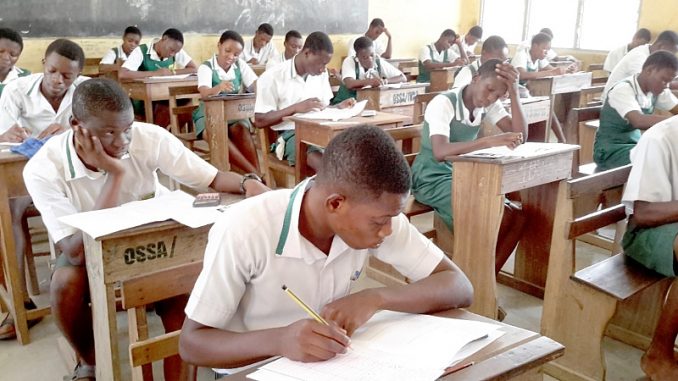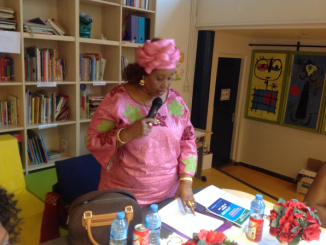
By Chernoh Alpha M. Bah
There has been a lot of outrage in Sierra Leone since the country’s Anti-Corruption Commission (ACC) handcuffed and frog-marched a group of school teachers allegedly arrested for “examination malpractice” in Freetown.
The dramatic event is a sequel to the country’s poor performance in the recently concluded West African senior secondary school examinations. The results, which show that Sierra Leone recorded more than a ninety percent failure rate, have been considered the worst national performance in any public examination over the last ten or more years. Some characterized the results as an indictment to the recently declared free school education program; indeed, they tend to slur the government’s celebration of its “free quality education program.”
As citizens try to come to terms with the bad examination results, the ACC, on its own, has suddenly taken center stage in the national debate. The commission has unfortunately and unhelpfully made itself the subject of a national conversation that was not initially about corruption but about standards in education. It should be noted that questions of examinations malpractice and the mass failure in public exams, including the poor-quality output of graduates from secondary and tertiary institutions, are not matters of corruption. They are structural problems related to standards of education and excellence, and they range from issues of curriculum development, to matters of pedagogy, to teacher training, to the quality and conduciveness of the teaching and learning environment, to improved teacher employment conditions, and many other service-related conditions and human resource development opportunities. To conflate these problems or associate and lump them under the general problematic umbrella of endemic public corruption that results from other related and not so related problems of the state is unhelpful to any national conversation designed to address the many challenges facing the education sector.
This is why the debate about “legality” versus “acceptability” that now surrounds the ACC’s operations since the commission chained and dragged those teachers to the city’s center, is completely draining and distracting national public attention from an emerging national conversation on the problems of education. It is unfortunate that what started as a debate on standards and pedagogy following the publication of the recent WASSE examinations results has suddenly shifted to a polarizing discussion on the endemic nature of corruption in the most unhelpful fashion.
To recalibrate this conversation, we must first examine why the ACC’s public exhibition of those accused teachers generated such furious outrage and debate? And why citizens who support the fight against corruption were themselves offended by the public images of the accused teachers? Most especially, why the president openly apologized for, what he calls, the wrongful action of the ACC, and whether the president’s recently announced measures in response to widespread “examination malpractices” is actually a solution to the education crisis confronting the country?
Indeed, those familiar with ancient judicial procedures know that the dragging of criminal suspects to a city’s center for full public spectacle is an ancient form of justice. Some hundreds or thousands of years ago, city states did invite public participation in the trial and punishment of deviants by open humiliation and public torture of accused persons. In those olden days, citizens witnessed the public torture of criminal suspects, and they participated joyfully in the orgy enactment of public torture. Back then, the administration of punishment was indeed a public event, something similar to what the ACC performed a few days ago in Freetown. But even then, suspects were first publicly interrogated or subjected to some kind of public trial, something equivalent to what Pontius Pilate did to Jesus Christ. But those were the days of the Roman empire when injustices reigned and when lack of regard for, what we today call, the rule of law was the norm. Certainly, those conversant with the unfair trial of Jesus Christ by Pontius Pilate can easily relate to the repulsive nature of the kind of justice the ACC enacted in modern Freetown.
By dragging those accused teachers in hand-cuffs and exhibiting them for a public spectacle, the ACC flipped the known values of modern society for its ancient savage roots when city states were not large enough and when societies had not separated the discharge of power into institutionalized domains. Many, including the president, rightly condemned the ACC’s action as a violation of due process and lack of consideration of the human rights of accused persons. Indeed, the Commission’s action goes against the grain of natural justice and the presumption of innocence that is so fundamental to criminal justice procedures anywhere in the world today. Pictures of hand-cuffed teachers, with criminal inscriptions hanging on their necks in front of the law courts of Sierra Leone, is comparable to the site of a slave auction in Jamestown, Virginia during the fifteenth century.
In strenuous efforts, the ACC leadership tried unsuccessfully to persuade the majority of right-thinking citizens that its action falls within the margins of acceptability even if it is against legality. This is despite additional legal argument to elongate the meaning of Section 7(1a) of the 2008 ACC Act that seem to imply that the commission can use all that is necessary to prevent corruption. Certainly, to do all that is necessary in defense of patria should surely not necessarily include the “public hanging” of accused persons or the suspension of their right to a fair trial before punishment. Those desperate enough to justify the acceptability of the commission’s action in this direction have gone to other police jurisdictions outside of Sierra Leone in search of similar images to demonstrate the supposed universal “margin of acceptability” that the commission assigned to its action.
However, what they failed to consider in the process of defending the ACC’s public exhibition of the accused teachers is the institutional arrangement of the criminal justice system. They avoided a fundamental question altogether, which deals with the actual place and actual role of the ACC within Sierra Leone’s law enforcement and criminal justice system. In other words, they need to ask if the administration of punishment is within the confines of the prosecution or the jurisdiction of a carceral institution? Every lawyer of good standing knows the distinction between these functions and the institutional arrangement of the justice system. The courts, the bar, the bench, the police, and the penitentiary are all intertwined but their different functions are clearly marked. A prosecutor’s role when it comes to punishment, for example, doesn’t extend beyond the bargain over the weight of judicial punishment; the final call of which always rests within the powers of the bench as supposedly dictated by an applicable statute. These institutional arrangements of the modern judicial system are done to supposedly enhance the administration of justice in a manner that is equitable, free, and fair. Thus, the ACC by its public exhibition of the accused teachers did not only violate the law, but the commission subverted the very institutional foundation surrounding the administration of law and justice.
The simple question about the actual role of the ACC – whether it a corruption-prosecuting institution or an institution set-up to punish corrupt offenders – would have put to rest the arguments about margins of “acceptability” versus “legality” that now characterize the ACC’s recent operations. Setting these aside also would have helped us enter into a more serious conversation on the many problems of standards in education and scholarly excellence, including the wide-ranging issues of academic fraud – plagiarism, grade inflation, exams administration, cheating – and all the other types of misconducts associated with the education sector. Such a focused national conversation would clearly deal with the actual place of the ACC’s “scorpion squad” raids on “examination malpractices” and find out if such militarized operations fall within the ACC’s mandate and whether they are actually going to resolve the crisis in education. In retrospect, an opportunity for a non-partisan conversation that examines the long-standing issues of academic fraud and misconduct within the context of the education crisis is right in front of the country. But we must first find out if these questions of academic fraud and misconduct – now simplified as exams malpractice – all fall within the typological definition of offenses that the ACC is actually mandated or truly expected to investigate?
Resolving these questions, will equally help us to properly contextualize, situate, and understand if in fact the collapse of standards in education is simply a matter of national corruption, or an illustration of more serious wide-ranging structural problems associated with institutional functioning of the state, and most essentially, the state’s ability to function as a state. Such a serious national conversation will also definitely address, even if in passing, the ever-growing confusion of sectoral responsibility and administrative misunderstandings of official responsibility prevalent in national institutional administration; a bad phenomenon that often creates undue institutional and individual competition among departmental heads for undue public relevance, the result of which often cripples and suffocates the realization of genuinely conceived state-led national development initiatives.
It is within this context of discourse, that we will be able to see how the ACC’s recent actions would appear to muddle our ongoing desire to collectively diagnose the problems of our education sector; it dribbles us against an opportunity to holistically examine the real problems of standards in education, the challenges of the teaching service, and by extension, the aspiration for scholarly excellence across all levels of education. Such an institutional distraction forces us into the wrong debate about legality versus acceptability. It becomes very obstructive because it drains the national energy and wrongfully diverts the national focus from the primary problem of standards and excellence in education and forces us instead to focus on individuals and institutions that are not really constitutive of the tertiary aspects of the national conversation. Whether this displacement of the national energy of the masses is a deliberate effort to divert our focus from the actual problem, or a sheer coincidence, or a combination of both, is in itself an indication of the operationalized confusion that characterizes most state institutions in the country. Interestingly, the ACC has wrongly energized and successfully instrumentalized this prevailing national confusion in new dramatic ways with its “scorpion squad” crackdown on “education malpractice.” We must now recalibrate the national conversation and redirect national energy and attention towards a real conversation on the education crisis in the country. Such a national conversation should situate the crisis in education within the national crises of development facing every sector of the country, from healthcare, to agriculture, to infrastructure, to the economy, to human resource management, and to the general administration of the state itself. It is only through such a holistic national conversation, devoid of the fire-brigade-type response to symptoms of one single social crisis, that the actual causes of national underdevelopment – both human and material – will be properly understood and truly tackled.



